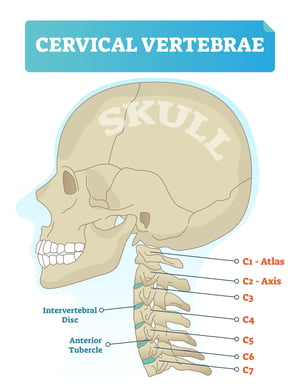Cervical Herniated Discs: Causes & Symptoms
4 min read

What is a Cervical Herniated Disc?
Have you noticed a sudden pain in your upper back and/or your neck or maybe tingling that runs down your arm? While there are several possible causes, one of them is a cervical herniated disc. It can happen pretty easily as we get older and can be treated with chiropractic care in most cases.
Let's take a closer look at this condition and learn about what can be done to relieve the pain and get you back to moving normally.
Cervical Herniated Disc Causes & Risk Factors
Where are Cervical Discs Located?
The cervical discs are in your neck. Specifically, from the base of your skull down to the top of your shoulders there are 7 bones identified with a number. Your doctor or chiropractor may mention which discs have herniated. The image below will show you where those are located.

What causes cervical discs to herniate?
The interesting thing about cervical herniated discs is that it can be really difficult to narrow down exactly what caused it. In fact, it's not uncommon for the condition to develop slowly with seemingly no cause at all. However, there are some reasons that could be linked to you having a cervical herniated disc, such as:
- Genetics: Unfortunately, you may get cervical herniated discs simply because your family is prone to them. If a close relative has had one, then there's a good chance that you could, too.
- Movement: Jarring movements can be the root cause of a cervical herniated disc.
- Strain: Twisting your body unnaturally or improperly lifting a heavy object could cause a strain that damages the disc.
- Age: As you age, your discs become more likely to be damaged. Younger people have plenty of water in their discs, but as you get older, the water decreases, causing them to become less flexible and more likely to result in a herniated disc.
Cervical Herniated Disc Symptoms
While pain is sometimes one of the first signs of a cervical herniated disc, many people have no symptoms at all and don’t recognize that they have a problem. However, if you do experience symptoms, they may include:
- Pain in the neck
- Numbness or tingling in the arm, shoulder, and down to your fingers
- Weakness in your arm or hand
However, if the cervical herniated disc ends up pressing up against your spinal cord, then you may have additional symptoms, including:
- Stumbling while walking
- Loss of balance
- Difficulty with fine motor skills (using your hands)
- Tingling sensation
If you notice any of these symptoms, it's important to schedule an appointment with your doctor or chiropractor right away so you can get started on a treatment plan that is suited for you.
Non-Surgical Treatments for Cervical Herniated Disc
Treatments for a cervical herniated disc can vary based on how bad the symptoms are. There are several things a chiropractor can do to help the disc heal and there are other medical treatments that can help.
Chiropractic Treatments for herniated cervical discs
People who are suffering from cervical herniated discs often benefit from chiropractic treatment. Some of the options that may be available to you include:
- Spinal Decompression: A nonsurgical option for relieving symptoms associated with herniated discs. Spinal decompression is done by gently stretching the spine for 15-30 minutes across several sessions. The treatment plan can be customized for your exact needs.
- Cold Laser Therapy: Cold laser therapy may be an option for reducing the back and neck pain you may feel with a cervical herniated disc. The laser is applied to the treated area, which makes the blood rush to it. This causes faster healing of damaged cells.
- Spinal Adjustment: Spinal adjustment relieves pressure on the spine by adjusting the vertebrae back to their original position. It offers neck and back pain relief. This may be recommended at various points in your treatment and is not likely to be recommended if you’re in a lot of pain.
- Massage Therapy: For more pain relief, you may also appreciate the services of a professional massage therapist. These techniques can offer pain relief and may be used alongside other treatment options.
Rest your neck
Rest is often suggested as a way to relieve pain and reduce swelling. Try to take it easy, and don't lift heavy objects. Avoid exercises and don't bend or twist. Ice may also help to relieve some of the pain, or sometimes people prefer to use a warm towel to soothe the symptoms.
Medications to relieve neck pain from a herniated disc
Over-the-counter medications such as Advil or Aleve may help reduce pain and swelling. However, these medications aren't supposed to be used long-term, and you should consult your doctor if you've been taking them longer than ten days. If these over-the-counter medications don't work, then your doctor may prescribe other pain medication short-term.
Get Help for Your Cervical Herniated Disc
If you've been living with neck and back pain for some time, know that you don't have to just struggle through it. The sooner you seek help the better, but even if it’s been a while, talk to one of our chiropractors in The Woodlands for an evaluation of your neck or back pain and can be recommended to help.






